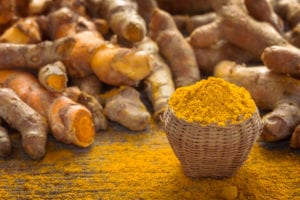Written by Chrystal Moulton, Staff Writer. Results from this trial suggest that adding curcumin to standard treatment for myeloma (Melphalan and Prednisone) could significantly increase overall remission.
 In both in vitro and in vivo studies, curcumin demonstrated antitumor and anti-inflammatory effects targeting the nuclear factor Kappa B [NF-kB] pathway1,2. Curcumin also targets pathogenesis of myeloma by affecting C-reactive protein [CRP], vascular endothelial growth factor [VEGF], tumor necrosis factor [TNF- alpha], lactic acid dehydrogenase [LDH], and interleukin 6 [IL-6]3,4. The ability of curcumin to affect disease activity and progression of myeloma along with other cancers shows promise for curcumin as an effective chemotherapeutic agent. In the current trial, researchers wanted to prove the efficacy of curcumin in the remission of myeloma and evaluate the effect of curcumin on various biological parameters5.
In both in vitro and in vivo studies, curcumin demonstrated antitumor and anti-inflammatory effects targeting the nuclear factor Kappa B [NF-kB] pathway1,2. Curcumin also targets pathogenesis of myeloma by affecting C-reactive protein [CRP], vascular endothelial growth factor [VEGF], tumor necrosis factor [TNF- alpha], lactic acid dehydrogenase [LDH], and interleukin 6 [IL-6]3,4. The ability of curcumin to affect disease activity and progression of myeloma along with other cancers shows promise for curcumin as an effective chemotherapeutic agent. In the current trial, researchers wanted to prove the efficacy of curcumin in the remission of myeloma and evaluate the effect of curcumin on various biological parameters5.
The study was designed as a single blinded randomized parallel study. Thirty-three myeloma patients were randomly assigned to one of two parallel study groups. The MPC group was treated with Melphalan, Prednisone, and curcumin (melphalan and Prednisone for seven days; curcumin 8g daily for 28 days). The control group was treated with Melphalan and Prednisone for seven days and a placebo. Each patient was followed up a total of four times during the trial. Researchers followed up with each patient every 28 days. During follow up visits, blood samples and physical examination was performed on each patient. At the end of the trial, researchers assessed serum levels of IL-6, LDH, CRP, VEGF, TNF- alpha, and NF-kB, and remission status.
Of the 33 myeloma patients at baseline, 23 patients completed this study (MPC group = 12, control group = 11). Eight patients died during the trial. One patient resigned from the study and researchers lost contact with one patient. Baseline characteristics showed no significant differences between the study groups. Overall remission in the MPC group was 75% (P < 0.05). Researchers observed a significant reduction in NF-kB levels (P = 0.027) and TNF-alpha levels (P = 0.004) in the MPC group compared to control by the end the trial. A significant reduction in VEGF levels was also observed in the MPC group at each follow up compared to control (P < 0.05). No significant difference was observed for CRP levels and IL-6 levels between the two groups. Within- group analysis showed that in both the MPC and control group CRP levels were significantly reduced (P= 0.01 and P= 0.04, respectively). In the MPC group, LDH levels decrease while in the control group LDH levels increased over the study duration. By the 4th follow up, the difference in change in LDH levels between the two groups was significant (P= 0.008).
Results from this trial suggest that adding curcumin to standard treatment for myeloma (Melphalan and Prednisone) could significantly increase overall remission. According to the researchers, additional studies would be needed to understand patient survival rate with curcumin as part of the treatment regimen.
Source: Santosa, Damai, Catharina Suharti, Ignatius Riwanto, Edi Dharmana, Eko Adhi Pangarsa, Budi Setiawan, Suyono Suyono, Mika Lumban Tobing, Suhartono Suhartono, and Soeharyo Hadisapurto. “Curcumin as adjuvant therapy to improve remission in myeloma patients: A pilot randomized clinical trial.” Caspian Journal of Internal Medicine 13, no. 2 (2022): 375.
© The Author(s)
Click here to read the full text study.
Posted January 24, 2024.
Chrystal Moulton BA, PMP, is a 2008 graduate of the University of Illinois at Chicago. She graduated with a bachelor’s in psychology with a focus on premedical studies and is a licensed project manager. She currently resides in Indianapolis, IN.
References:
- Kamat AM, Sethi G, Aggarwal BB. Curcumin potentiates the apoptotic effects of chemotherapeutic agents and cytokines through down-regulation of nuclear factor-kappaB and nuclear factor-kappaB-regulated gene products in IFN-alpha-sensitive and IFN-alpha-resistant human bladder cancer cells. Mol Cancer Ther. Mar 2007;6(3):1022-30. doi:10.1158/1535-7163.Mct-06-0545
- Aggarwal BB, Gupta SC, Sung B. Curcumin: an orally bioavailable blocker of TNF and other pro‐inflammatory biomarkers. British journal of pharmacology. 2013;169(8):1672-1692.
- Bharti AC, Donato N, Aggarwal BB. Curcumin (diferuloylmethane) inhibits constitutive and IL-6-inducible STAT3 phosphorylation in human multiple myeloma cells. Journal of immunology (Baltimore, Md : 1950). Oct 1 2003;171(7):3863-71. doi:10.4049/jimmunol.171.7.3863
- Binion DG, Otterson MF, Rafiee P. Curcumin inhibits VEGF-mediated angiogenesis in human intestinal microvascular endothelial cells through COX-2 and MAPK inhibition. Gut. Nov 2008;57(11):1509-17. doi:10.1136/gut.2008.152496
- Santosa D, Suharti C, Riwanto I, et al. Curcumin as adjuvant therapy to improve remission in myeloma patients: A pilot randomized clinical trial. Caspian J Intern Med. Spring 2022;13(2):375-384. doi:10.22088/cjim.13.2.9
